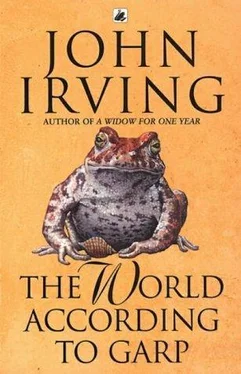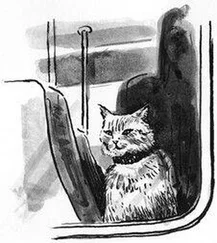Everyone laughed again.
“And do you also know how you die?” John Wolf asked him.
“Let's stop this,” Helen said. And to Garp she said, “If you say, “In an airplane,” I will not forgive you.” Behind the lightly drunk humor in her voice, John detected a seriousness; it made him stretch his legs. “You two better go to bed,” he said. “And get rested for your trip.”
“Don't you want to know how I die?” Garp asked them.
They didn't say anything.
“I kill myself,” Garp said, pleasantly. “In order to become fully established, that seems almost necessary. I mean it, really ,” Garp said. “In the present fashion, you'll agree this is one way of recognizing a writer's seriousness? Since the art of the writing doesn't always make the writer's seriousness apparent, it's sometimes necessary to reveal the depth of one's personal anguish by other means. Killing yourself seems to mean that you were serious after all. “It's true ,” Garp said, but his sarcasm was unpleasant and Helen sighed; John Wolf stretched again. “And thereafter,” Garp said, “much seriousness is suddenly revealed in the work—where it had escaped notice before.”
Garp had often remarked, irritably, that this would be his final duty as a father and provider—and he was fond of citing examples of the middling writers who were now adored and read with great avidity because of their suicides. Of those writer-suicides whom he, too—in some cases—truly admired, Garp, only hoped that, at the moment the act was accomplished, at least some of them had known about this lucky aspect of their unhappy decision. He knew perfectly well that people who really killed themselves did not romanticize suicide in the least; they did not respect the “seriousness” that the act supposedly lent to their work—a nauseating habit in the book world, Garp thought. Among readers and reviewers.
Garp also knew he was no suicide; he knew it somewhat less surely after the accident to Walt, but he knew it. He was as distant from suicide as he was from rape; he could not imagine actually doing it. But he liked to imagine the suicidal writer grinning at his successful mischief, while once more he read and revised the last message he would leave—a note aching with despair, and appropriately humorless. Garp liked to imagine that moment, bitterly: when the suicide note was perfect, the writer took the gun, the poison, the plunge—laughing hideously, and full of the knowledge that he had at last got the better of the readers and reviewers. One note he imagined was: “I have been misunderstood by you idiots for the last time.”
“What a sick idea,” Helen said.
“The perfect writer's death,” said Garp.
“It's late,” John Wolf said. “Remember your flight.”
In the guest room, where John Wolf wanted to fall asleep, he found Duncan Garp still wide-awake.
“Excited by the trip, Duncan?” Wolf asked the boy.
“My father's been to Europe before,” Duncan said. “But I haven't.”
“I know,” John Wolf said.
“Is my father going to make a lot of money?” Duncan asked.
“I hope so,” John Wolf said.
“We don't really need it, because my grandmother has so much,” Duncan said.
“But it's nice to have your own,” John Wolf said.
“Why?” Duncan asked.
“Well, it's nice to be famous,” John Wolf said.
“Do you think my father's going to be famous?” Duncan asked.
“I think so,” John Wolf said.
“My grandmother's already famous,” Duncan said.
“I know,” John Wolf said.
“I don't think she likes it,” Duncan said.
“Why?” John Wolf asked.
“Too many strangers around,” Duncan said. “That's what Nana says; I've heard her. “Too many strangers in the house.”
“Well, your dad probably won't be famous in quite the same way that your grandmother is,” John Wolf said.
“How many different ways are there to be famous?” Duncan asked. John Wolf expelled a long, restrained breath. Then he began to tell Duncan Garp about the differences between very popular books and just successful ones. He talked about political books, and controversial books, and works of fiction. He told Duncan the finer points of book publishing; in fact, he gave Duncan the benefit of more of his personal opinions about publishing than he had ever given Garp. Garp wasn't really interested. Duncan wasn't, either. Duncan would not remember one of the finer points; he fell asleep rather quickly after John Wolf started explaining.
It was simply John Wolf's tone of voice that Duncan loved. The long story, the slow explanation. It was the voice of Roberta Muldoon—of Jenny Fields, of his mother, of Garp—telling him stories at night in the house at Dog's Head Harbor, putting him to sleep so soundly that he wouldn't have any nightmares. Duncan had gotten used to that tone of voice, and he had been unable to fall asleep in New York without it.
In the morning, Garp and Helen were amused by John Wolf's closet. There was a pretty nightgown belonging, no doubt, to one of John Wolf's recent, sleek women—someone who had not been asked to spend last night. There were about thirty dark suits, all with pinstripes, all quite elegant, and all failing to fit Garp by about three extra inches in the pantlegs. Garp wore one he liked to breakfast, with the pants rolled up.
“Jesus, you have a lot of suits,” he said to John Wolf.
“Take one,” John Wolf said. “Take two or three. Take the one you're wearing.”
“It's too long,” Garp said, holding up a foot.
“Have it shortened,” John Wolf said.
“You don't have any suits,” Helen told Garp.
Garp decided he liked the suit so well that he wanted to wear it to the airport, with the pantlegs pinned up.
“Jesus,” Helen said.
“I'm slightly embarrassed to be seen with you,” John Wolf confessed, but he drove them to the airport. He was making absolutely certain that the Garps got out of the country.
“Oh, your book,” he said to Garp, in the car. “I keep forgetting to get you a copy.”
“I noticed,” Garp said.
“I'll send you one,” John Wolf said.
“I never even saw what went on the jacket,” Garp said. “A photograph of you, on the back,” John Wolf said. “It's an old one—it's one you've seen, I'm sure.”
“What's on the front?” Garp said.
“Well, the title,” John Wolf said.
“Oh, really?” Garp said. “I thought maybe you decided to leave the title off.”
“Just the title,” John Wolf said, “over a kind of photograph.”
“"A kind of photograph",” Garp said. “ What kind of photograph?”
“Maybe I have one in my briefcase,” Wolf said. “I'll look, at the airport.”
Wolf was being careful; he had already let it slip that he thought The World According to Bensenhaver was an “X-rated soap opera.” Garp hadn't seemed bothered. “Mind you, it's awfully well written ,” Wolf had said, “but it's still, somehow, soap opera; it's too much , somehow.” Garp, had sighed. “ Life ,” Garp had said, “is too much, somehow. Life is an X-rated soap opera, John,” Garp had said.
In John Wolf's briefcase was a snip-out of the front cover of The World According to Bensenhaver , missing the back-jacket photograph of Garp and, of course, the jacket flaps. John Wolf planned to hand this snip-out to Garp just moments before they said good-bye. This snipout of the front cover was sealed in an envelope; the envelope was sealed in another envelope. John Wolf felt pretty certain that Garp would not be able to undo the thing and look at it until he was safely seated in the plane.
Читать дальше












